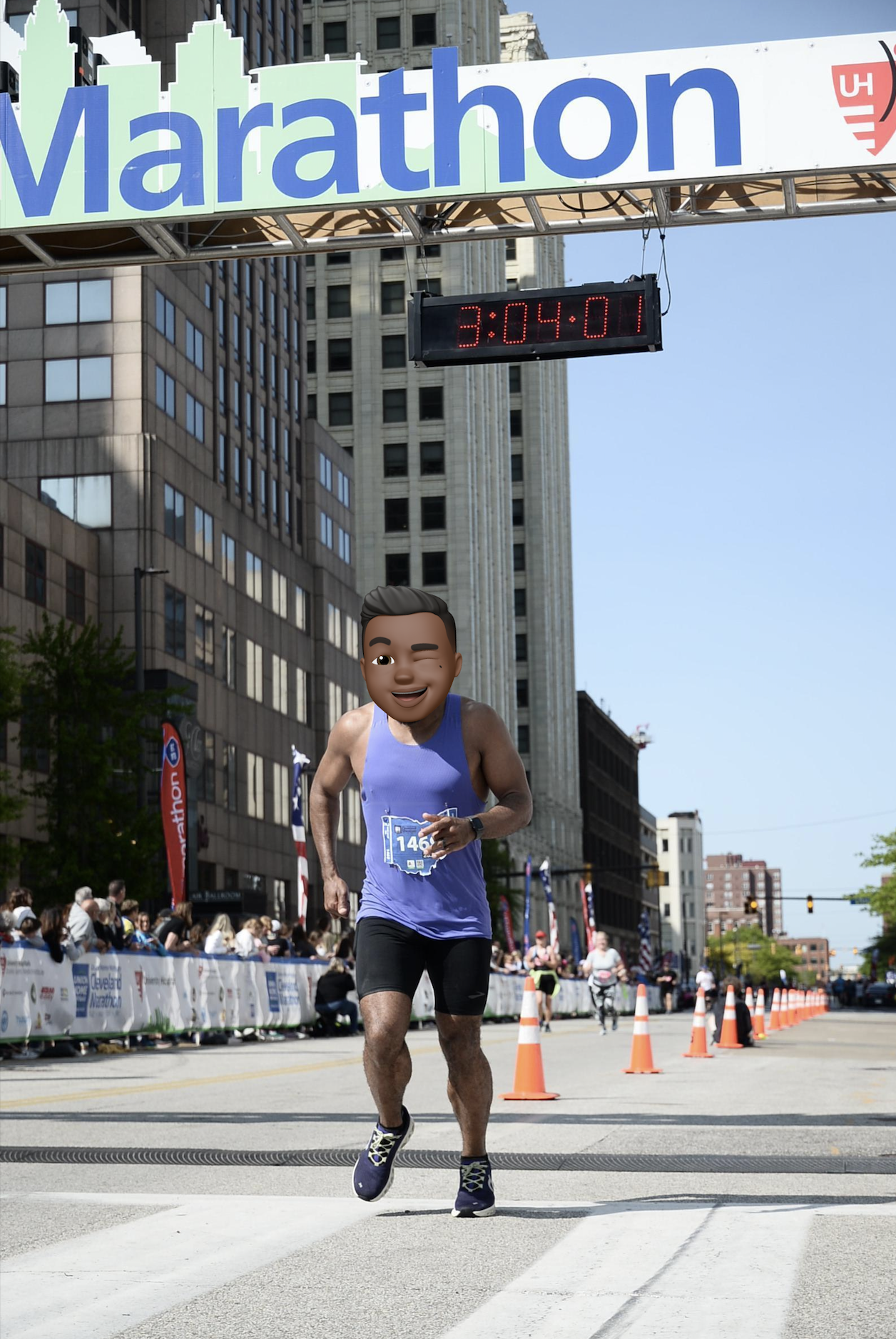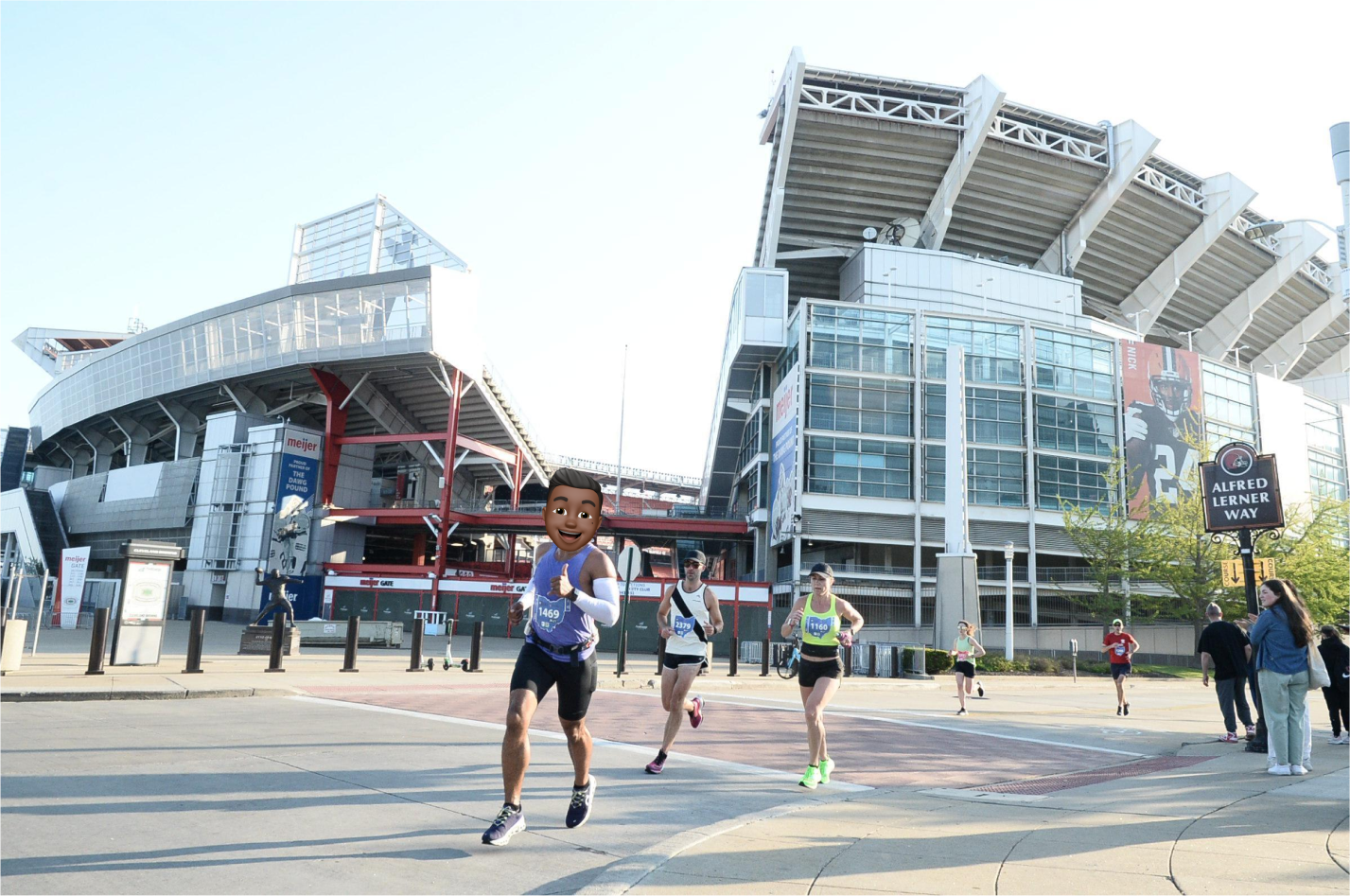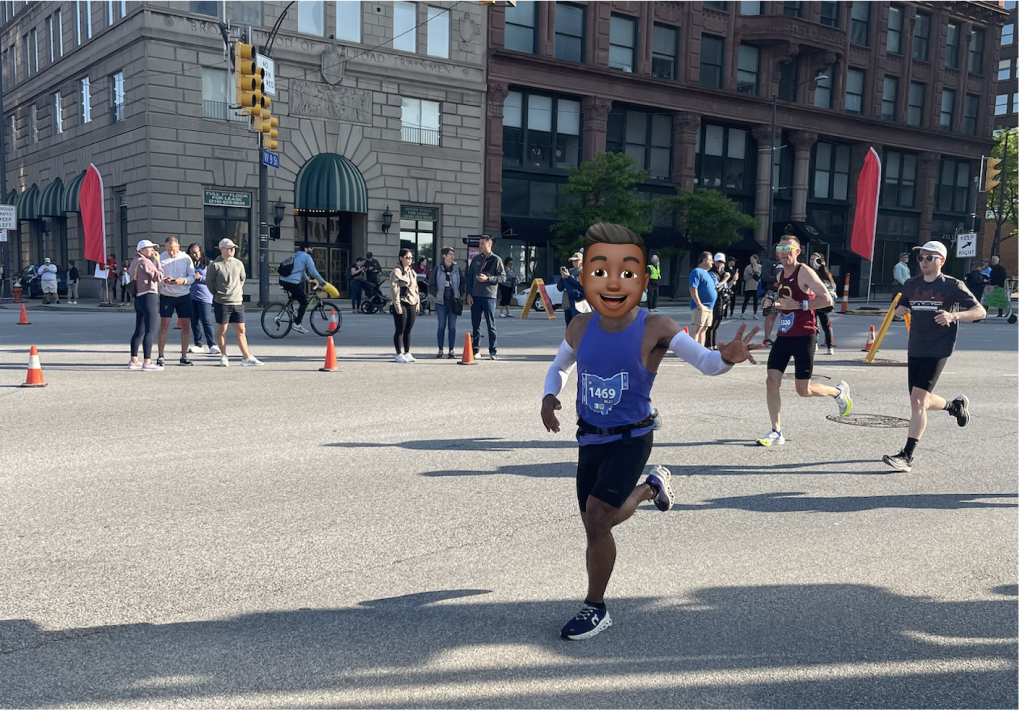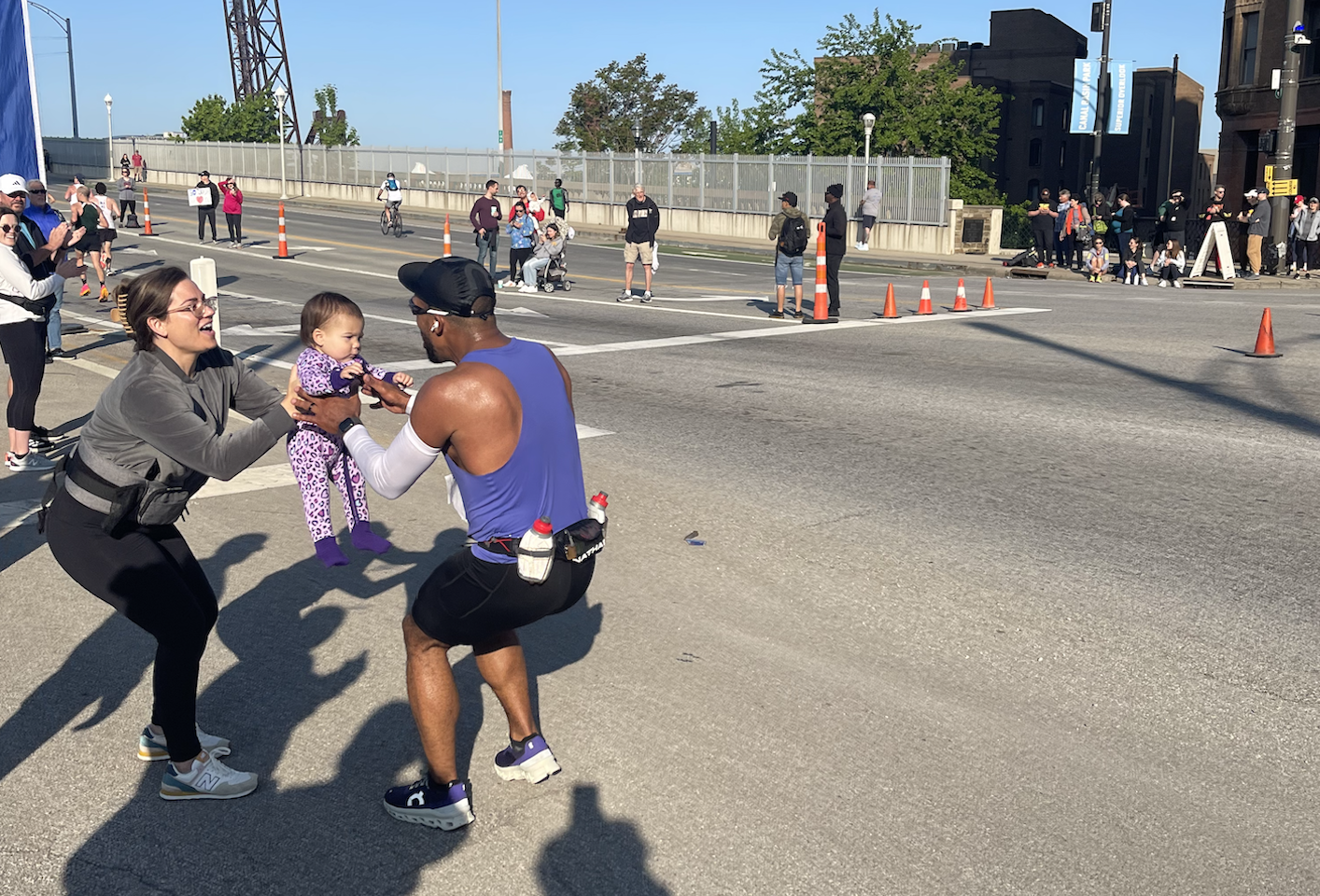My Creative Marathon
May 31, 2023
The marathon, a 26.2 mile or 42.1 kilometers long-distance race. They typically don't tell you that it could be the most mentally, physically, and spiritually demanding thing you will ever do in your life. Experiencing it makes the $150 you pay and the hundreds of hours spent training very well worth it. The question really is...Why should anyone do it?
Well, last week, I finished the Cleveland Marathon. My first marathon race; completed in 3 hours and 4 minutes (it's a decent time, look it up). I'm writing this piece to hopefully empower you to also run one, creatively.

If your first response was "naw dog", congrats, you sound like my wife (love you). But stick with me here; if you are developing your craft in any way (which most of us probably are), marathon training is exactly like it. Obviously much more physical; however, the discipline and mental strength gained throughout the training can be closely related to getting that college degree, learning a new language, or even completing a design project.
What all of these have in common is the need for intrinsic motivation. I define intrinsic motivation as motivation that originates without any external drivers or incentives. I've realized this is a non-negotiable quality in anyone I hire at a small studio. If you are only driven to do something because of external factors, as soon as those external factors shift, you will no longer have the same drive and most likely will quit doing what you initially set out to accomplish.
An excellent example of this is when I attempted my first marathon, I was turning 33, and I made a goal to be in the best shape of my life. A way for me to make that more specific and measurable was to run a marathon. I trained for 16 weeks through the Seattle winter, and 6 weeks out, the marathon was postponed. Now if I was only running this marathon to race, say I ran a marathon or to be seen by others, I would have quit. But instead, I kept the original race date and ran a marathon on my own. Yep!, you read that correctly. I chose a park, invited as many friends and family as possible, and ran a marathon. Long story short, I was in the best shape of my life when I turned 33. Until now, of course.
So here are 5 lessons from marathon training that can be applied to any craft;

The Timeline
Just like a project, there is a set amount of time you plan to work on it. You set the deadline and work backward from there. Avid runners call this a 'training block, which typically lasts between 12-20 weeks. For this race, my training block was 20 weeks and started on the 1st of the year.
Timelines are essential because it puts everything about the project that may be intimidating into perspective. I would say to myself, "I am going to be training for 20 weeks." It is an investment. It is a commitment. Most importantly, it is not just a commitment for you but also for those closest to you. They will be going on this journey with you.
Typically, as you become more experienced, you know precisely how to break down a timeline to reach your due date successfully and build something incredible simultaneously. I used Daniels' Running Formula for this training because I already had a copy from previous trainings. This is why at a small studio, we are very selective about our clients. When a new opportunity arises, if my whole team can not say the words "I am going to work on this project for 20 weeks" with a smile on their face, we will not take on the project. Our time is our most valuable resource, so when you commit to something, please do yourself a favor and commit. A good rule of thumb is when you say "YES" to something, it should be followed up by many "NO's" to protect that "YES." Make sure you are saying yes to the right things. For more on this, read Gary Kellers book "The One Thing".

The Training
As I exhale deeply, simply put, this is the work. You can only accomplish something in life by making an effort. Why do we train? Training is one way to get better. Whether it is to run a sub-3-hour marathon, be a great partner or parent, do great at work, or build a successful business, you train to get better. If you had no desire to get better, there would be no reason to train. I could make an argument that if you are not constantly training you are in fact regressing. But that is for a different article.
My training block was broken down into weekly plans. The primary goal of these weeks was to run a certain number of miles. If I did nothing else, I would be able to complete a marathon by just running the miles- nothing more, nothing less. However, if you have a time goal, you need to run these miles at a certain pace or speed. In addition, each week included two quality workouts, one long run to build endurance and one-speed workout to build strength. When put this way, it seems pretty simple, right? It was. The tricky part was making time and space for all those miles and workouts weekly while being a husband, a father to a 1-year-old, and leading a small studio. However, just having the plan made it that much easier to execute.
I averaged about 8 minute-miles throughout the whole thing; that is 120 hours of time I spent with my thoughts.
I'm not going to sugarcoat this; the training hurt. It hurt bad. My legs and feet were sore for 20 weeks and more sore the week after the marathon. But training isn't easy; if it was, would we really be getting better? No. Throughout marathon training, your heart gets stronger to pump more blood throughout your body, your lungs get stronger to make sure that blood is full of oxygen, and of course, your muscles get stronger to make sure you can run 26.2 miles at a certain pace. One thing about training that is often overlooked is the mental and spiritual growth that occurs. During my training, I ran just about 900 miles. I averaged about 8 minute-miles throughout the whole thing; that is 120 hours of time I spent with my thoughts. Yes, many of those thoughts were some form of "this hurts"; however, I'd say most of the time I was thinking about my family, that project I was working on, or just spending time with God and taking in the beautiful landscape around me.
Over those 900 miles, I found so much peace in my day-to-day life. This was when I could release all the worries, anxieties, anger, fear, or just the weight of the day. We all need time to do this, no matter what our craft. By saying yes to training for this marathon, I gave myself 120 hours to work through my stuff and ultimately become a better person…because that is why we train

The Rest
In other words, the healing. After every one of those 900 miles, my muscles would be broken down further and further. That is the beautiful thing about the human body; it literally heals itself. We need to talk about this more. To heal properly, we need rest. This can mean different things depending on what you are attempting to accomplish. But the common method of rest is sleep. Lots and lots of sleep...This is a hard thing for me because I practiced the art of the all-nighter during architecture school. I know I'm not alone out there. Nearly 11 years later, I still instinctively stay up late to get just a little more done. But I realized that if I just rested, the work would be much easier after a good night's sleep.
Regarding marathon training, besides 8 hours of sleep every night, stretching is the second most important aspect of rest. This became the most important thing for me because my calves were incredibly tight and would cause me a lot of pain in my feet. So every night after my daughter went to sleep, I spent at least 45 minutes stretching and rolling out my calves on a foam roller. Doing this led to much better sleep because it helped calm my mind and helped release my aching muscles from the 900 freaking miles they were running.
Many great efficiency gurus talk about the wind-down routine. No matter your craft, you have to rest at some point. I highly recommend you add it to your timeline and do not sacrifice it because if you do, it can lead to a pulled muscle or, in most creative cases, burnout.
The Nutrition
I’ll try not to spend too much time on this section because there are soo many resources out there for you. However, I couldn't talk about marathon training and not mention nutrition. We can all agree that everything you put into your body affects what comes out of it. You can be super disciplined about this, or you could be casual about it. Regardless, your body needs fuel. To do anything, you need energy. Every day you burn a certain number of calories, even if you sit at your desk the whole day and don't even get up to use the bathroom. You should replace those calories daily to maintain energy levels and continue getting better at your craft. For my marathon training, I was burning 1,200 calories a day on average.
The way I approached this was based on my weight. My goal was to lose at most 5 pounds throughout my training. So, I had to replace all of the calories and some. As long as I wasn't losing weight, I knew I was eating enough...What you eat is up to you!
One last thing on this, something I realized, was how much I needed to eat before the big race or even a hard workout. I needed those calories in me to perform at my best. I'd say the same could be said for a big presentation or big deadline. I guess all I am saying is don't expect to have energy without the proper nutrition.

The Flow State
A common reason people get into running is to experience a runners high. What that is exactly, I still don’t know. However, when it comes to marathon training I’ve defined it as being able to maintain a pace that was once unbearable with ease and delight. For example, when I started training I ran 12 miles at 9:30/mile pace and barely finished. It hurt…bad. Flash forward 900 miles, I was running at 7:00/mile pace with a smile on my face dancing with myself down the street to my favorite music.
Marathon training is all about getting so comfortable with a certain pace that you could sustain that pace for 26.2 miles. Repetition and consistency is key to doing anything well. In this case, I wanted to run a sub 3 hour marathon so that 7:00/mile pace had to become my best friend. Today, I can run that pace in my sleep.
The same can be said for the creative flow within your craft. Have you ever been creating something and it just all came together beautifully without much resistance? That is your runners high! The odds are you may not experience that feeling your first time creating something. Odds are it will be painful and that is ok! But I guarantee you that after your 900th mile, you will find a smile on your face and you may find yourself dancing while you do it.
A crystal clear takeaway from my running this marathon is; Talent isn’t enough. As a creative, you need self-motivation and consistency to set yourself apart. To become a creative anomaly, you need to be prepared to make meaningful and intentional choices that allow you to become better. That is it, better. Keeping your sights set on becoming better rather than the best, will ultimately empower and accelerate the creative journey we are all on.
Disclaimer: The content of this article is not a medical professionals opinion and a small studio is not licensed to give advice on anything concerning your physical or mental health. This is an opinion piece and you should consult a medical professional if you have any doubt about your physical or mental ability to run a marathon. Be safe out there y’all.


